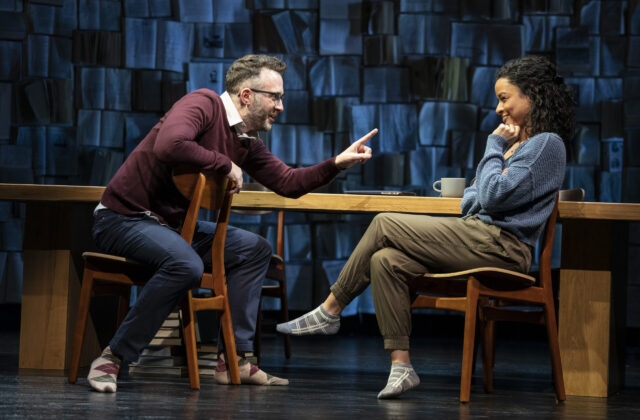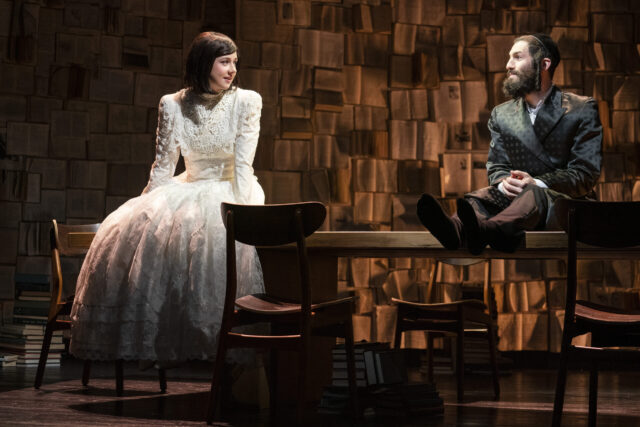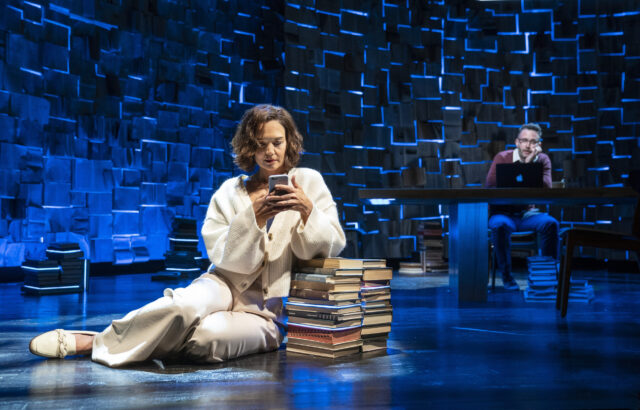
Abe (Eddie Kaye Thomas) and Sophie (Sarah Cooper) share a rare fun moment in Anna Ziegler’s The Wanderers (photo by Joan Marcus)
THE WANDERERS
Roundabout at Laura Pels Theatre
Harold and Miriam Steinberg Center for Theatre
111 West 46th St. between Sixth & Seventh Aves.
Tuesday – Sunday through April 2, $91-$174
212-719-1300
www.roundabouttheatre.org
“There’s no remaking reality,” Nancy remembers her father saying to her in Philip Roth’s Everyman. “Just take it as it comes. Hold your ground and take it as it comes. There’s no other way.”
Roth’s career and writings about Jewish parents and children are pivotal in Anna Ziegler’s The Wanderers, which opened last night at Roundabout’s Laura Pels Theatre. The play is almost too literary for its own good: Marion Williams’s set consists of about a dozen piles of books on the floor, a long library-style table, and several back walls completely covered in open books, their pages pleading to be read; some of the characters enter and leave through gaps in the walls, as if they’re walking in and out of novels. Kenneth Posner’s lighting often casts the books on the wall and the floor in heavenly glows, including a neon blue. The scenes unfold in chapters with such titles as “Marriage,” “Children,” “Boredom,” “Destruction,” and “Fiction.”
The Wanderers, a name that evokes the forty years the Jews spent in the desert searching for the Promised Land after escaping slavery in Egypt, goes back and forth between 1973–82 and 2015–17, primarily in Brooklyn. Abe (Eddie Kaye Thomas) is a dour but extremely successful and self-absorbed writer, having won two National Book Awards and the Pulitzer Prize (as did Roth); among his popular tomes are The Theory of Milk (as in a mother’s nurturing?) and Orphan. His wife, Sophie (Sarah Cooper), is considering writing a second novel but she’s tentative because her first book, published ten years earlier, was poorly reviewed. Abe’s parents, Esther (Lucy Freyer) and Schmuli (Dave Klasko), were Satmar Jews living in Williamsburg; Sophie is biracial and half Jewish (on her father’s side).
After giving a book reading at which Hollywood superstar Julia Cheever (Katie Holmes) — a nod to Pulitzer Prize–winning author John Cheever — sat rapt with attention right up front, Abe is contacted by the glamorous actress over email; she’s starring in an adaptation of Roth’s Everyman, and the two kick off a flirtatious online friendship. Initially, Abe reads the emails out loud off his laptop by himself (or to Sophie), but soon he and Julia are both onstage, as if involved in face-to-face conversations. The more time he spends with Julia, the less time he has for Sophie and their two (unseen) kids.

Esther (Lucy Freyer) and Schmuli (Dave Klasko) prepare to comsummate their arranged marriage in Roundabout production (photo by Joan Marcus)
Meanwhile, some forty years before, Esther and Schmuli are commencing their life together through an arranged marriage; as the babies begin coming, Esther imagines a life where she has more choice, where she is not restricted by the draconian Hasidic rules, which are particularly fierce and limiting on women. As a child, Esther would sneak off with her best friend to read books in the library, and as a mother she wants her children to read books other than the Torah, but it is forbidden.
The parallels between Esther and Schmuli’s marriage and Abe and Sophie’s increase as The Wanderers heads to its final chapters, even if we are well aware of certain conclusions. “I was seventeen when I realized I was going to marry Abe,” Sophie explains in her opening monologue. “I was almost forty when I realized I would leave him.”
Listening to characters pontificate about art and the creative process, whether writing or acting, can get didactic and pretentious, and Ziegler (Boy, Actually) is guilty of that while also recognizing it. “Okay, I know you hate hearing my dreams —” Sophie divulges. “When did I say that?” Abe responds. “It’s the look on your face when I start to tell one,” she says, the same look audience members get when a show becomes preachy. But Ziegler is able to work her way around that with other dialogue that is subtly powerful. After telling Abe her dream, Sophie admits, “And when I woke up, you were gone.” He explains, “I couldn’t sleep so I went for a run.” She says softly, “No . . . that’s not what I meant.”

Hollywood superstar Julia Cheever (Katie Holmes) checks her phone while Abe (Eddie Kaye Thomas) pines for her (photo by Joan Marcus)
Barry Edelstein’s (The Underpants, The Misanthrope) direction tends toward the languid as actors walk onstage, talk, then walk offstage, except for Thomas (Golden Age, The Submission), who when not in a scene is watching it from the sides, taking notes for his next book. Unfortunately, Abe is such an unpleasant character that being in his presence is a downer; when he declares, “People hate me. . . . They’re offended by my very existence,” we understand why. Cooper, an author (100 Tricks to Appear Smart in Meetings, How to Be Successful without Hurting Men’s Feelings) and stand-up comic who gained notoriety for her TikTok videos in which she lip synced to statements by Donald Trump, is strong in her off-Broadway debut; the show would have benefited from more of her and her character, who is more intriguing than the others.
Holmes (All My Sons, Dead Accounts) brings a sweet innocence to her portrayal of the captivating Hollywood star, wearing fashionable white outfits that make Julia an angelic figure. (The costumes are by David Israel Reynoso.) Freyer (Romeo & Juliet, Malefactions) and Klasko (Gordy Crashes, King Lear) are effective in roles that are becoming all too familiar (and are all too real), a Hasidic wife who wants more out of life but is trapped by the suffocating intolerance of her husband and community.
Ultimately, The Wanderers is an homage to Roth, almost to a fault, as Ziegler features quotes from his books, right from the opening dialogue, when Sophie tells the audience, “Abe loved to read to me. Mostly his own writing, but also passages from his favorite novels; once, at a Foot Locker, he recited the last lines of Sabbath’s Theater by Philip Roth over and over. ‘And he couldn’t do it. He could not fucking die. How could he leave? Everything he hated was here.’” It’s hard to compete with that.